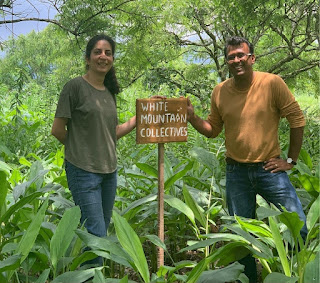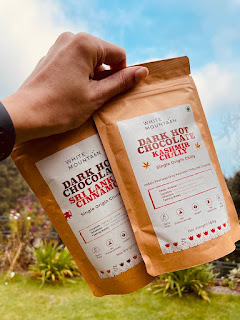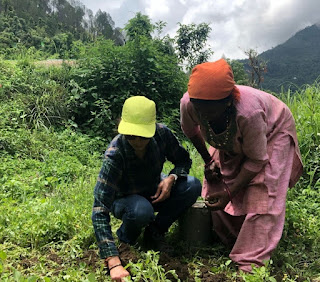I am excited to kick off my all new Food Business in Focus series with an article on White Mountain Collectives. One, because it features Janhavi Prasada, who in addition to being one amazing person is also one of my oldest friends. And two, because White Mountain Collectives, the Food business we are exploring today, was inspired by Haldi, or Turmeric, the "Golden Spice'' that has been valued in Indian culinary culture for millennia before it became the global golden child it is today! (You might remember the live I did with Jahnavi on Turmeric farming for Spice Chronicles with RMG. )
RMG: Tell us. What was the inspiration behind White Mountain Collectives?
JP: The brand is only two years old. My cofounder, Anmol Gupta, and I chose the name White Mountain Collectives because we loved the way it felt and sounded. We were clear it had to be something with mountains in it!
We began with creating avenues. Contacting farmer friends I knew who were growing turmeric. Asking them to give us a chance, as an experiment based on my past rapport with them (which was crucial). Over time we built and strengthened relationships. Trying to grow different Turmeric varietals, we started with Kumaoni and Lakadong turmeric. Today we have a plot of 2 hectares, and we're experimenting with new turmeric types, with Pragathi being our most recent trial.
RMG: Tell us how you decided the product portfolio and how you have nurtured it?
JP: So, turmeric as a product or a new brand would be difficult to sustain by itself in a fiercely competitive industry. But turmeric really did take prime focus for our brand, due to the pandemic. Everyone was looking to boost immunity and began to consume turmeric. While we began experimenting with growing Kumaoni and Lakadong turmeric we simultaneously explored possibilities of creating more usage scenarios; including creams, soaps, gin, and more. That’s when our Hot chocolate with Turmeric entered the picture.. Of course, I was always on a mission to discover the next big flavour. Which led to the addition of our Vanilla Frappe and more.
RMG: So where is White Mountain Collectives Product Portfolio headed from here? What else do you plan to add to your product portfolio?
JP: I’m glad that chocolate came our way. Our hot chocolate was well received. I recognised that the chocolate sector has potential to become the next big thing. And as a brand our focus has progressed from turmeric to cacao plantation. I have been working with farmers down south. And from turmeric, we're branching out into chocolate. We just launched Hot Chocolate with Kashmiri Chillies and another with Sri Lankan Cinnamon. We are also looking at launching a Cacao Tea!
RMG: With a beautiful boutique property and Turmeric farm, do you plan to bring it all together into a turmeric experience at some point?
JP: Yes, I'd love to do that! All of this is on our minds and in our heads. I'd love to have a small window over in one corner, where I can show people how things are done. Invite people to come to our harvests, volunteer, and engage with our farmers. At the end of the day, experience is everything! Especially in the hospitality industry where it adds to the brand value. And it would be wonderful for people to know where crops come from and what it takes to grow them!
That in a sense was the catalyst of the entire WMC ethos. I remember the first time I went to the farm to sow turmeric. I was like ‘sab log shuru karte he’ (let’s all start). And one of the lady farmers says Chalo tum bhi Kudali uthalo jaldi se (Come, you also quickly pick up the Kudali-a tool used for farming). So I picked up the kudali and started digging. And in literally 5 mins I was sweating! I couldn't sit on my haunches for more than 2 mins. But I did it, I dug about 3-4 rows, then took the rhizomes in my hand, and placed them in the rows.
It was a very sacred act for me. It ignited a deep feeling of gratitude towards farmers and how much hard work, sweat and toil they put in everyday! And deep feelings, of thanking the Earth, for what it does, the miracle that is going to happen after that moment when you put the rhizomes in the soil. It was quite mind blowing, so yeah it is certainly an experience I would love for others to get a taste of!
RMG: That sounds absolutely amazing! So Janhavi, I am curious what a typical field day is like for you. Take us through your activities.
JP: It takes me about 1 ½ hours to drive from Nainital to Chaafi, where the fields are. I love the drive because it spans beautiful terrain, with a river that runs beneath our fields. My route comes to a crossroad after which there is a lot of off-roading onto kaccha roads, past small hamlets dotted with beautiful pahadi homes. This is almost the vegetable bowl of the region, so it's very lush and green. Once I get to the top of the road, on the mountain, I park my car and then we have to walk about 50-60 meters down-hill, along a steep, winding path hauling equipment, fertilisers, seed sacks, and other supplies. Depending on what season you choose your equipment. If you're just weeding then you take your kudalis. We arrive, to where the farmers are waiting, fortify ourselves with tea and continue down to the khet to get to work. The farmers are so dexterous with their hands, they know exactly what to do! Overall it is a bit of a logistical challenge, but in the mountains, everyone does it. And maybe that's part of the allure!
RMG: I must say I am fascinated, how does it feel to work with a group of women farmers?
JP: What happens when a group of women get together? Be it in a city or in a village it’s the same thing! The heart of women never changes. There’s lots of laughter, a lot of joking and merriment.
But I’ve also attended their self-help group meetings. These are the women of the soil. And there’s so much to learn from them. The men just stand around with poker faces and listen to what the women are saying but will not extend a helping hand at all. And I will tell you, I don’t know what is the case in other states but in Uttarakhand, statistics show that it is the women who are the key bread earners on the land. And these amazing women, will also be all dressed up in their sarees, teekas, celebrate all festivals, and mark all traditions- they keep them all alive!
But I think of these ladies as Janes of the jungle - not the Tarzans. But real Janes! They’ll climb any tree to pick fruit or lunge for a pumpkin hanging from a tree. And they are so generous! At the end of the day, they will load us up with fresh tomatoes, karelas, whatever is growing in their gardens, will be collected in their saree pallus and deposited before us with instructions - "chalo ye aapke liye hai aur ab aap isko ghar le jao acchese khana" (this is for you, carry it home and eat well)!
It was absolutely riveting to hear about Jahnavi's journey with White Mountain collectives. Her vision, passion and determination are so inspiring! In conclusion here are three top things I admire about White Mountain Collectives:
The Soul of the Brand. So much heart has been put into every stage of its evolution. It takes heart to pick something like turmeric as a flagship product and then stick with one's vision.
The investment is learning and innovation. That Janhavi is constantly 2 steps ahead with ideas and innovations exhibits agility and creativity, something small businesses need to grow, both expansively and deeply.
The thoughtful packaging. Living up to the adage wearing ones heart on ones sleeve, the design incorporates Uttarakhand's Aipan Art portraying proud women farmers and lends the products and brand unforgettable identity.
Read more about White Mountain Collectives and shop for their products.
---------------------------------------------------------------------------------------------------------------------------
~ With inputs from Himani Sona, pictures courtesy - White Mountain Collectives




No comments:
Post a Comment